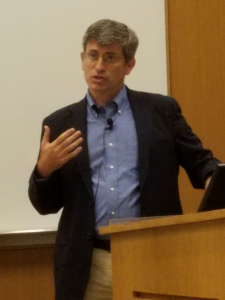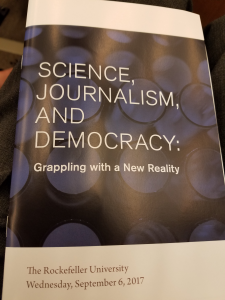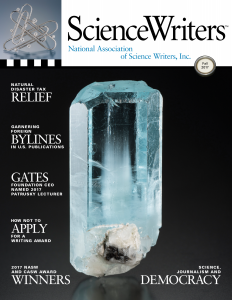By Joanne Nicholas
The current media landscape is a confusing swirl of reality, misinformation, and so-called fake news. How can science communicators navigate a political climate that's increasingly hostile to both science and journalism?
Experts from several related disciplines addressed the situation at a day-long conference hosted by the Rockefeller University. Perhaps of some comfort, many speakers reassured the audience of journalists, publishers, academics, historians, attorneys, scientists, and executives of nonprofits that this type of polarization has happened in the past and will not last forever.
The Sept. 6 event was organized by David Levine and Joe Bonner, board of directors co-chairs of Science Writers in New York (SWINY); Brooke Borel, freelance writer and NASW board member; and Franklin Hoke, executive director of communications and public affairs, the Rockefeller University. Within days of opening registration all 200 seats were reserved and the livestream fully subscribed.Keynote speaker Carl Zimmer, New York Times columnist and adjunct professor at Yale University, provided a cautionary tale of the intersection of bad science, bad journalism, and government in the person of T.D. Lysenko, a Soviet agronomist during the Stalin era, who claimed, among other things, to be able to grow spring wheat from the seeds of winter wheat (ignoring genetics). Despite scientists' concerns that his research could not be replicated, "Politics overtook science," explained Zimmer.
Lysenko's work was considered an advance, extolled by the government, and covered in Pravda with quotes from officials but not scientists. Geneticists with contrary opinions were attacked and 3,000 lost their jobs. Some scientists were imprisoned for their doubts while those "forced to be political prospered." Meanwhile, famine and deprivation worsened in the U.S.S.R. and people starved.
"History can familiarize and warn," said Zimmer, who explained that societal changes "do not happen overnight." He encouraged journalists to defend their principles, report debate, and always write for the public "not Pravda."
Mariette DiChristina, editor in chief of Scientific American and moderator of the science, journalism, and democracy panel, emphasized that science and journalism are critical supports of democracy. Not surprising, this is not the first time both have been under attack. "Science has been politicized by all modern presidents since World War II," said Michael Halpern, deputy director of the Center for Science and Democracy.
Among strategies helpful for journalists, Dan Fagin, director of the Science, Health and Environmental Reporting Program at New York University and recipient of the 2014 Pulitzer Prize for General Nonfiction, recommends beginning with data not a narrative. "We are always told we want to build narratives," he said. "But if we let our narrative build our stories, it can get away from facts."NYU Professor Charles Seife told journalists to "verify what people in power say." Speak to them, examine their documents and when necessary, make a narrow Freedom of Information Act (FOIA) request "so you won't be stuck for years."
Matt Schafer, counsel at BuzzFeed News and an expert on FOIA, said requests can take from three months to five years or longer. He recommends your request reference the statute requiring the agency to respond with an estimated compliance date, so that personnel know you know the law. Schafer also recommends submitting small FOIA requests sequentially by topic and time rather than one large request.
As for your own information, Suzanne Schmeelk, security expert at Memorial Sloan Kettering Cancer Center, discussed the importance of maintaining data integrity. "Calculate the impact if it is exposed," she said. Among Schmeelk's data safety tips: run anti-virus software frequently; know that https is encrypted but most emails are not; keep your operating system and browser up to date; have separate passwords for all sites; and as for Skype, "as soon as you trust another party, there is a risk level there."
Regarding the new administration impact on journalists, "to say that Donald Trump's election changed everything is sort of true and sort of not true," said Virginia Hughes, senior editor at BuzzFeed News. "It's hard to sort out what is normal." Hughes' audience skews young, female and social media savvy. "Our team is trying to focus on how science intersects with their life so they can hold leaders accountable," she said.
Kendra Pierre-Louis, environmental reporter at Popular Science, tries to subtly intersect politics with science. "I rarely use 'climate change' since our readers don't believe it," she said. In a story about the Arctic ice breaking off, "I talked about how we could see this crazy thing because of the technology from a NASA program that is getting cut."
The final panel questioned where the line is drawn for scientists and journalists to be activists. Moderator Michael Lemonick, opinion editor at Scientific American, said "nobody has an answer for this." While Lemonick didn't think twice about appearing in the Women's March, his editor told writers they could cover it but not participate as "it might color their objectivity."In closing remarks, Philip Yam, editor at the Simons Foundation, summarized the conference's three main points for science journalists:
First: We've been through it before and survived. Along with a new administration "we have to learn to live with," there are also the challenges of changing news platforms and business models.
Second: Journalists should emphasize facts and do solid reporting about data. "Find facts first using tools like FOIA requests and becoming friends with officials," he said. "We need to focus on the communication process of science."
Third: Stay true to the principles of journalism but also be adaptable to audience needs. Be like a circulation manager and build new audiences by understanding how they consume news.
"A free press is crucial to tell real truths," said Yam. "It goes to the very heart of our democracy."
Joanne Nicholas is a New York-based health and medical writer and Public Relations strategist.
Conference agenda
Session videos
Keynote speaker Carl Zimmer, NYTimes columnist
David Sassoon, InsideClimate News, and Kendra Pierre-Louis, Popular Science, Heather Murphy, New York Times, addressing the current landscape for science journalism
(NASW members can read the rest of the Fall 2017 ScienceWriters by logging into the members area.) Free sample issue. How to join NASW.




